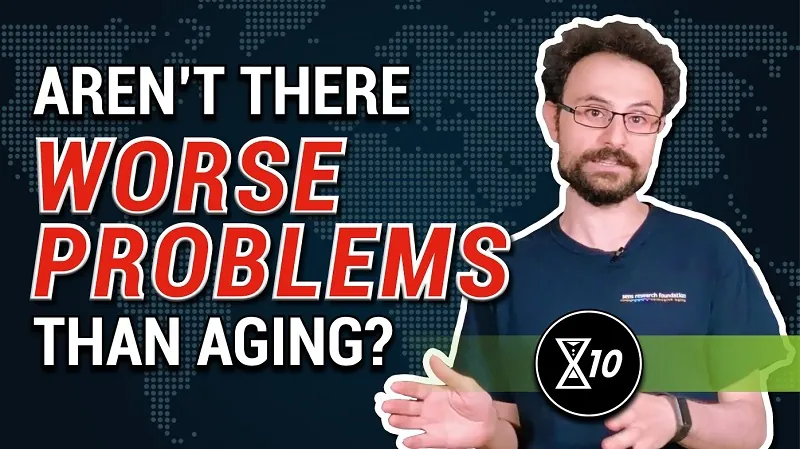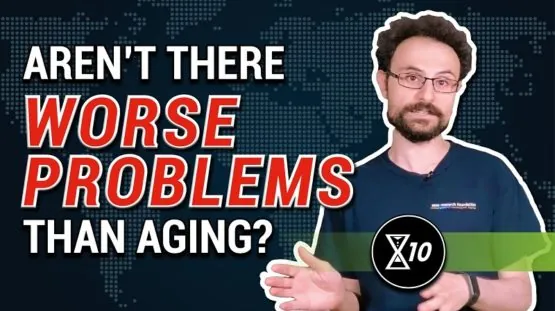In this informative episode of X10, Nicola talks about the idea that there might be worse problems than aging, outlining just how bad aging is in comparison to other causes of death—and asking whether or not it’s a good idea to rank such problems at all.
A transcript of this episode is available below.
“There are worse problems than that!”
In all likelihood, you’ve been told that at least once in your life. Whatever the issue you care for might be, there’s always somebody ready to lecture you about how there are worse problems to take care of, more or less subtly implying that what you’re advocating for can be neglected in favor of other, alleged “first-class” problems.
And you can bet that the problem of aging doesn’t get to be in first class too often.
Before we dive into the details of just how serious a problem aging is, and whether its solution of rejuvenation biotechnologies should be a priority, it’s worth noting that brushing off an issue because there are supposedly more serious ones is a seriously bad idea—so bad, and yet sadly widespread, that it’s got a well-deserved place among the most common logical fallacies; it’s known as the appeal to worse problems.
The first, obvious problem with this kind of reasoning is that whether something is or isn’t worse than something else is subjective; you might think that problem A is worse than problem B, whereas your friend might think the opposite, and unless you both agree on a way to measure the gravity of A and B once and for all, neither of you is right or wrong.
Secondly, even if we could rank all possible problems in the world in order of gravity in such a way that everyone agreed on this classification, problem B might be less serious than problem A and still be a tragedy.
On top of that, a list of all problems in the world would be very long, and neglecting all the problems that didn’t make first place until the problem at the top of the list was solved would most assuredly result in a ton of different problems going downhill on us while our backs were turned—for example, think of what could happen if we paused solving global warming until world hunger was totally eradicated, or vice versa.
If we’re talking about global problems that cause suffering and death—and aging is most definitely one of them—this ranking business gets somewhat shady, morally speaking, because it would imply that not all types of suffering and death are equal; some of them would be less worthy of attention.
If you said that curing malaria should be prioritized over giving starving children enough to eat, or vice-versa, you’d probably end up with a bunch of people at your throat, and their outrage would be completely understandable—especially when you think that we’re more than capable of working on multiple problems at the same time and that there’s no need to put starving children or malaria patients on a waiting list.
Besides, if we ever decided that all other problems can wait until the most serious of them has been solved, then it seems reasonable that anything that isn’t even a problem can wait too—therefore, we should shut down the film industry, or all amusement parks, to divert all time and resources we have to the solution of problem number one, and you can probably see more than one reason why that is never going to work.
This shows why appealing to worse problems isn’t a way of discounting the importance of another problem, including that of aging; speaking of which, why is aging a problem, and how serious is it?
Biologically speaking, aging is a set of processes of deterioration that induce damage in your tissues, both at the cellular and the molecular level; the diseases of old age are nothing but the end-stage of these processes, so they’re a result of aging.
Besides causing suffering, these diseases are responsible for two-thirds of all deaths around the world every day, for a total of about 100,000. For comparison, that’s about 30 times the number of people who died during the 2001 World Trade Center terrorist attack, one of the deadliest in history.
On a yearly basis, aging kills around 36.5 million people, which is about three times more deaths than World War II killed per year on average, and about seven times more than World War I killed per year on average. So, we’re not talking peanuts here.
Additionally, the data shows that causes of death that are largely related to aging, such as cardiovascular diseases, cancer, diabetes, and dementia, essentially dwarf all other causes of death, such as HIV, malaria, malnutrition, or tuberculosis; some of these have even started to climb their way to the top in low-income countries too, overtaking the toll taken by HIV or malaria.
If we judge the gravity of a problem based on the suffering it causes and the lives lost to it, then aging wins hands down against any other cause of death, but this does not mean that other causes of death should be neglected; they all deserve attention.
Aging isn’t to be taken lightly from a socioeconomic point of view either, as expenditures to take care of the aged, or pay their pensions, are sky-high, and the kind of care we can provide right now is unable to fully restore people’s health or independence, and it ultimately cannot prevent their death.
Now, some may object that it’s not worth going through the trouble of curing old people, for the very reason that they’re old and they’re going to die soon anyway. Waste of time and effort, right? Wrong! They wouldn’t die anyway, precisely because rejuvenation biotechnologies would fully restore their health and prevent their death.
This also applies to the “thank Heavens that aging is the leading cause of death, otherwise people would die young” line of thinking; if aging wasn’t the leading cause of death, people would die young in a world without rejuvenation. If we did have rejuvenation therapies in place, people wouldn’t die young; if and when they did, they would probably and hopefully be very, very old, killed by a phaser shot during a deep space mission or something.
Last but not least, we shouldn’t forget that research is always research—medical research on aging and rejuvenation will advance our understanding of human biology in general, possibly leading to more general medical applications than “just” treating aging.
Furthermore, aging research is a relatively new and small field compared to fields that tackle more “traditional” global problems, such as epidemics or social and environmental issues; unlike aging, these problems already receive a lot more public attention and have much more money thrown at them, and the necessity of their resolution is accepted nearly universally.
There’s really no reason to divert the little attention and resources that aging gets to causes that are already well-established—if anything, aging research could use a little more love from us all.
Thank you very much for watching this episode of X10, and a truly heartfelt thank you to the Lifespan Heroes. It’s thanks to their donations that LEAF and its initiatives, such as the crowdfunding platform for aging research Lifespan.io, or X10 itself, can exist at all.
If you’d like to join the Lifespan Heroes and help us take aging off humanity’s list of problems to solve, whatever ranking it might be at, you can do so at lifespan.io/hero; and if you’d like to learn more about aging and rejuvenation, you can head over to youtube.com/lifespanio and subscribe.




